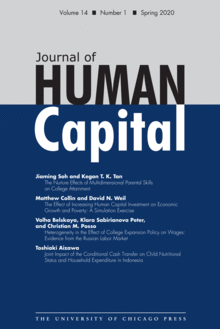JOURNAL OF HUMAN CAPITAL
Número:
4
Publicado:
Clasificación JEL:
F16

Lo más reciente
Jhorland Ayala-García, Leider Manjarres-Beleño, María Urueta-Polo
Luis E. Arango, Luis E. Arango, Luz Adriana Flórez, Carlos Esteban Posada
Oscar Iván Ávila-Montealegre, Anderson Grajales, Juan José Ospina-Tejeiro, Mario Andrés Ramos-Veloza
We assess the impact of COVID-19 pandemic on the automation process in Colombia, a country with low R&D and productivity and high labor informality. We estimate event-study models to evaluate the differential effect of the pandemic on job openings and salaried employment by the potential degree of automation of each occupation. The results indicate that both vacancies and salaried employment declined more in highly automatable occupations. However, there is no evidence of persistent effects. We find that automation mainly affected the labor market of females, individuals over 40 years old, and low-paid occupations.


 Didier Hermida-Giraldoa,
Didier Hermida-Giraldoa, 


